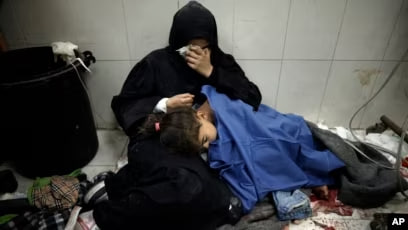Gaza’s Death Toll Exceeds 26,000, According to Health Ministry Reports
Gaza’s Health Ministry reported a death toll exceeding 26,000 and over 64,400 wounded during a three-month war. In the last 24 hours, 183 Palestinians were killed and 377 injured in Israeli strikes. The Israeli military is investigating an attack that killed at least 20 people and wounded 150 in Gaza City as they waited for humanitarian aid.
In central Gaza, an Israeli airstrike on a house in Al-Nusseirat refugee camp during the night resulted in six casualties, as reported by Palestinian health officials. The death toll from a Wednesday strike on a United Nations training center in Khan Younis has reached 12, with over 75 wounded, according to Thomas White, a senior official with the United Nations agency for Palestinian refugees. The U.N. relief agency did not directly blame Israel but mentioned that the facility was hit by tank fire, and Israel is the only force with tanks in Gaza’s second-largest city. The Israeli military, while ruling out its aircraft or artillery, is still investigating the attack, suggesting the building might have been hit by a Hamas rocket. The ongoing conflict aims to end Hamas’ control of the Gaza Strip since the October 7 attack, severely disrupting humanitarian aid and leading to catastrophic hunger levels in Gaza, according to ActionAid. People are resorting to grinding animal feed for use as flour.
ActionAid has issued a warning, stating that a potential famine is imminent in the region, particularly in the north where aid delivery faces significant challenges. According to their statement, water scarcity in Gaza is severe, with residents having access to only 1.5 to 2 liters of water per day for all their needs, including sanitation.

In addition to these challenges, the United Nations has reported that the weather has turned rainy and chilly, heightening concerns about the spread of illness. Ajith Sunghay, the head of the U.N. Human Rights Office for the Occupied Palestinian Territory, emphasized that the situation was predictable for this time of the year and has rendered the already unsanitary conditions in Gaza uninhabitable for many, as people lack adequate clothing and blankets.
Meanwhile, the U.S. government has established a communication channel with Israel to address concerns regarding civilian casualties and damage to infrastructure in Gaza resulting from Israeli attacks. This channel was initiated following a meeting between U.S. Secretary of State Antony Blinken and Israel’s war Cabinet earlier this month.
A senior U.N. official has called for “every measure” to be taken to safeguard civilians, particularly in the wake of the recent attack on the Khan Younis training center, where thousands of displaced Palestinians have sought refuge. The U.N.’s White pointed out that the situation in Khan Younis underscores a consistent failure to uphold the fundamental principles of humanitarian law.
White expressed strong disapproval of ongoing attacks on civilian locations in Khan Younis, emphasizing the immediate need for them to cease. The situation involves casualties and injuries, with intensified fighting near hospitals and shelters hosting displaced individuals, leading to people being trapped inside and hindering life-saving operations.
The United States, a crucial ally of Israel in its conflict with Hamas, condemned the attack on the training center. State Department spokesperson Vedant Patel reiterated the importance of protecting civilians, respecting the designated status of U.N. facilities, and ensuring the safety of humanitarian workers who play a vital role in providing life-saving assistance to civilians.
Philippe Lazzarini, the head of the U.N.’s Palestinian relief agency, affirmed that the Khan Younis compound was clearly identified as a U.N. facility, and its coordinates had been shared with Israeli authorities.
The leader of the World Health Organization called for an immediate cease-fire in the conflict, describing the conditions in Gaza as “hellish” during an address to the organization’s governing body on Thursday.
WHO Director-General Tedros Adhanom Ghebreyesus emphasized that war doesn’t offer a solution but instead leads to more conflict, increased animosity, greater suffering, and heightened destruction. He urged a choice for peace and the political resolution of the issue during a session of the WHO Executive Board in Geneva.
Efforts are underway by the U.S. and certain Middle East countries to negotiate a new cease-fire, aiming for a 30-day pause in hostilities. The objective is to facilitate the release of hostages and Palestinians held in Israeli jails. In a late November cease-fire lasting a week, around 100 hostages held by Hamas and 240 Palestinians incarcerated by Israel were freed. However, as of now, no new cease-fire agreement has been reached.







